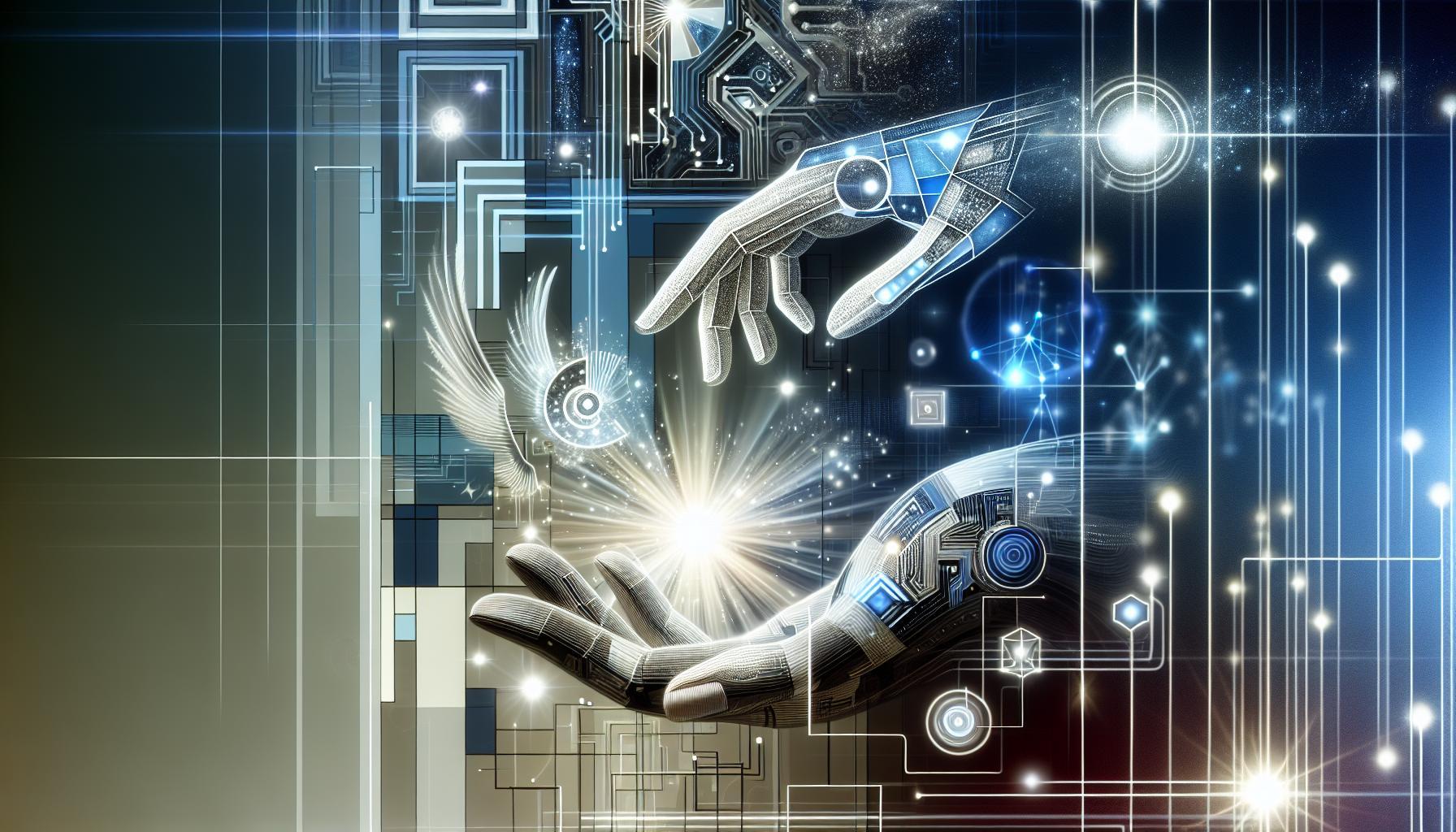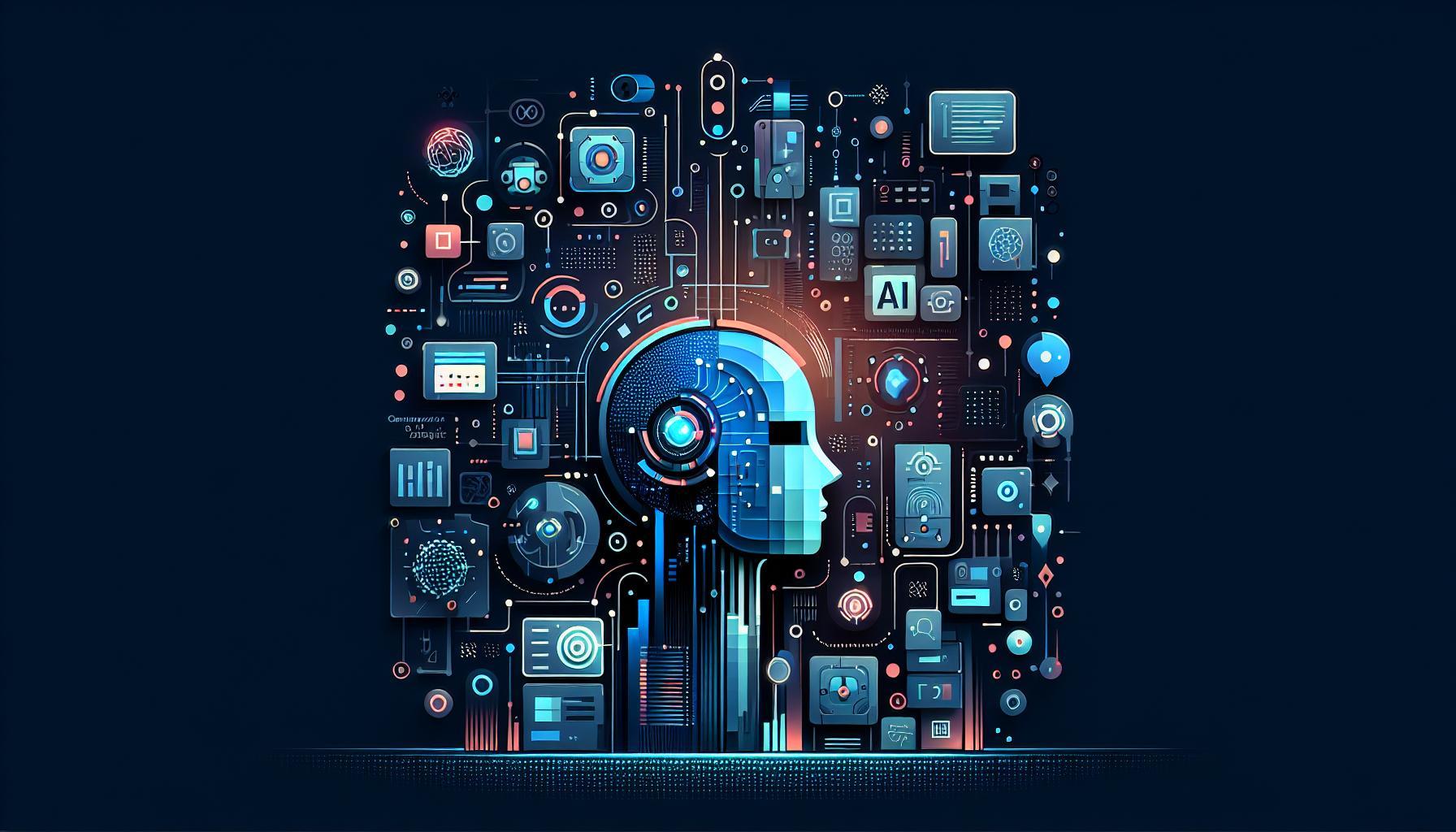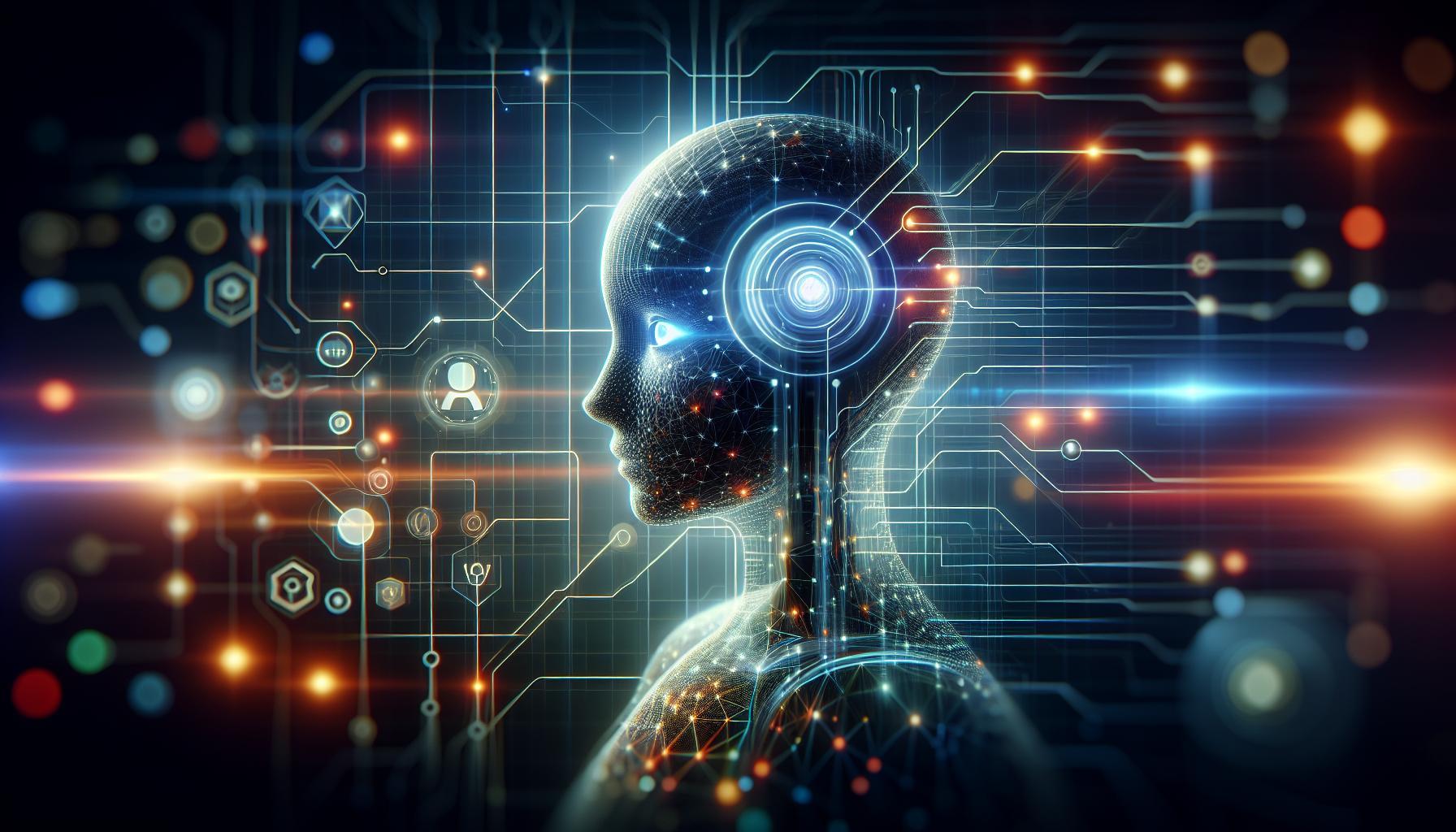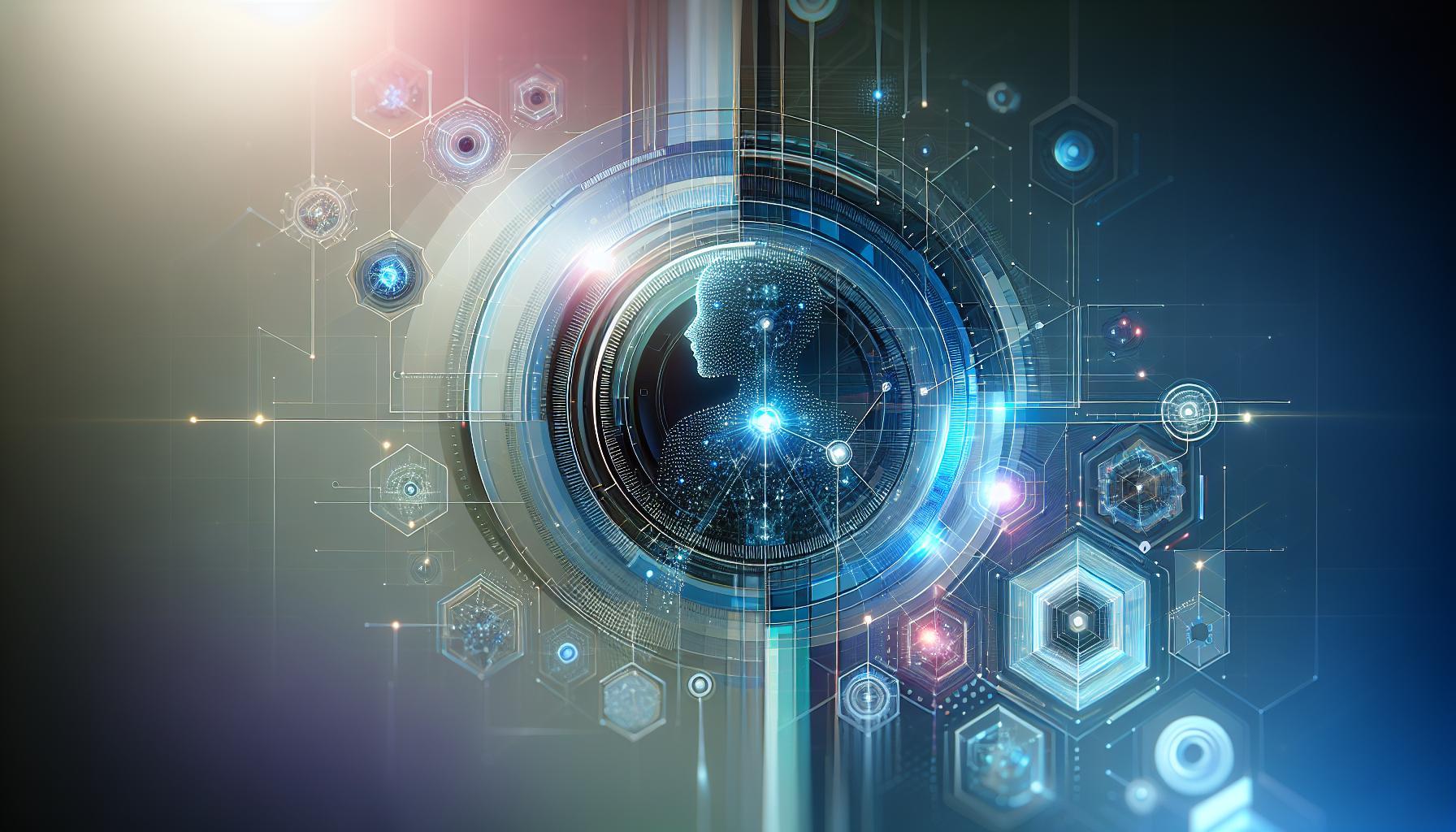As artificial intelligence reshapes our world, many ponder its implications on faith and morality. Exploring scriptural insights on technology reveals essential guidance on ethics and humanity’s role in innovation. This discussion is vital for anyone navigating the intersection of spirituality and modern advancements, inviting us to reflect on the profound questions of existence and purpose.
Understanding the Intersection of AI and Faith: A Biblical Perspective
The rise of artificial intelligence invites profound questions that echo throughout the teachings of the Bible, especially concerning morality and our role as stewards of creation. As technology advances exponentially, the responsibility to engage thoughtfully with AI intertwines with Biblical principles, urging believers to seek ethical pathways that align with their faith. When contemplating AI from a biblical perspective, one must consider the concept that humans are created in the image of God (Genesis 1:27). This defines our uniqueness and potential while also setting a standard for the kind of technology we choose to develop and implement.
Ethics Rooted in Scripture
The Bible provides a moral compass that guides believers in navigating the complexities of modern technology. Many biblical principles—such as love, justice, and stewardship—are critical as we explore what AI means for humanity. For instance, the commandment to love our neighbors (Mark 12:31) reminds us that technology should enhance human dignity rather than detract from it. When developing AI, we must ask ourselves: Does this technology serve the greater good? Does it help those in need, or does it create additional barriers?
Moreover, the wisdom literature of the Proverbs offers insights into pursuing righteous paths in our endeavors. Proverbs 3:5-6 advises believers to trust in the Lord and acknowledge Him in all their ways, implying that spiritual discernment should guide the integration of AI into society. This call to divine guidance can help tech innovators and users alike to reflect on the implications of their work, ensuring that ethical considerations remain at the forefront
Practical Steps for Engaging with AI
Believers can take actionable steps to integrate faith with technology, effectively embodying the teachings of the Bible in their approach to AI:
- Educate Yourself: Stay informed about the latest developments in AI and their ethical implications. Engage in discussions with both faith and tech communities.
- Promote Ethical Design: Advocate for AI systems that prioritize transparency, fairness, and accountability, reflecting Christian values.
- Collaborate with Others: Form interdisciplinary teams that include theologians, ethicists, and technologists to holistically address AI challenges.
- Research and Reflect: Dive into theological discussions about technology, perhaps joining forums or study groups exploring the intersection of AI with faith.
As Christians engage with the growing field of AI, reflecting on what the Bible says about the intersection of faith, ethics, and technology becomes essential. By staying rooted in scripture and guided by ethical considerations, believers can help shape a future where technology acts as a tool for human flourishing, echoing God’s purpose in our lives.
Ethical Considerations: What the Scriptures Say About Technology
In our technologically advanced world, where innovations emerge at a staggering pace, ethical considerations about the role of technology are more pertinent than ever. The intersection of faith, ethics, and technology, as explored in discussions about AI, calls us to reflect profoundly on how scriptural teachings inform our approach to these advancements. The scriptures provide a moral foundation that can guide the ethical deployment of technology, advocating for intentions that align with human dignity and the common good.
Guidance from Scripture
The Bible encourages us to use our gifts wisely and with intention. In James 1:5, we are reminded to seek wisdom from God, which can be invaluable when navigating the complexities of modern technology. This call to pursue divine wisdom elicits a critical examination of the implications of our technological innovations, encouraging us to consider their impact on society. For instance, the development of artificial intelligence must be approached with careful consideration of its potential biases and the ethical responsibilities that accompany its use.
Moreover, scriptures emphasize the importance of stewardship. In Genesis 1:28, humanity is charged with the responsibility to cultivate and care for the earth. This principle can extend to our technological landscapes; we must consider whether our innovations contribute to or detract from human flourishing and environmental sustainability. By adopting a stewardship mindset, we can ensure that technology serves humanity rather than undermines it, aligning with ethical frameworks discussed in contemporary debates around AI and ethics.
Real-World Applications of Scriptural Ethics
To put these teachings into practice, individuals and organizations can take actionable steps guided by biblical principles:
- Establish ethical guidelines: Create codes of conduct for technology use that incorporate biblical values, focusing on integrity, honesty, and respect for all individuals.
- Promote inclusivity: Ensure diverse voices are included in technology development processes, aligning with the scriptural call to love and respect our neighbors (Mark 12:31).
- Engage in continual education: Stay informed about emerging technologies and their societal impacts, fostering a community of learners who can apply biblical wisdom to new challenges.
By integrating these ethical considerations rooted in scripture with modern technological advancements, we can create a future where innovation aligns with faith-based morals. This approach not only addresses the immediate challenges posed by AI and technology but also promotes a sustainable and ethical framework that honors our responsibilities as stewards of God’s creation.
The Role of Creation: Humanity, AI, and Divine Intent
The intersection of creation, human ingenuity, and divine intention has sparked a profound dialogue, especially in the context of artificial intelligence. As humanity advances technologically, the ethical implications of AI compel us to reflect on our role as creators. The biblical narrative emphasizes that humans are made in the image of God, empowering us with creativity and reason. This divine resemblance not only places a responsibility on us to innovate but also urges us to ensure our innovations align with ethical standards rooted in compassion and integrity.
AI, as a product of human creativity, embodies the dual nature of creation—it can be a tool for tremendous good or a vehicle for unintended consequences. The Bible imparts wisdom on stewardship, inviting us to consider how technologies serve broader human flourishing rather than merely technological advancement. This calls for an intentional approach to development within the realms of AI, prompting us to ask critical questions: Are we prioritizing human dignity in our AI designs? Do our creations reflect our values, and are they advancing the common good?
Divine Intent and Ethical Considerations
Integrating divine intent into the discourse on AI encourages us to engage deeply with the moral framework provided by scriptural teachings. The Bible’s emphasis on love, justice, and humility serves as a guidepost for developing ethical standards around AI technologies. For instance, implementing responsible AI practices, such as transparency, accountability, and fairness, can resonate with the biblical principle of serving others and seeking the well-being of the community.
Practically, organizations can adopt a faith-informed ethical framework when deploying AI systems by:
- Establishing diverse teams that include perspectives from various backgrounds and beliefs.
- Engaging in regular ethical audits of AI systems to assess impacts on society.
- Promoting inclusive access to technology, ensuring that marginalized communities are not left behind.
By framing these efforts through the lens of our shared humanity and divine purpose, the ongoing conversation about AI’s role in society can become a more robust examination of what it means to create responsibly in an age defined by rapid technological change.
Ultimately, the conversation surrounding AI, faith, and ethics is grounded in the belief that our creations should reflect a commitment to fostering a just and equitable world, echoing the divine intent behind our own existence and innovation. As we navigate the complexities of AI, returning to these foundational principles offers a pathway toward harmony between human creativity and the divine purpose it seeks to fulfill.
Wisdom in Innovation: Biblical Guidelines for Tech Development
In the rapidly evolving landscape of technology, wisdom drawn from biblical principles can guide innovators seeking to align their developments with ethical considerations and divine creativity. The Bible illuminates pathways that encourage creativity while integrating accountability, community, and a moral compass. This multifaceted approach to innovation can serve as a powerful framework for responsibly advancing technology, such as artificial intelligence, enriching both personal and societal outcomes.
Creativity as a Divine Gift
The narrative of creation in Genesis underscores that human creativity is a reflection of God’s image. Just as God created the world with intention and care, we are invited to innovatively address the needs of our surroundings. This parallels the concept of innovation addressed in [2], where the creative application of knowledge is essential for meaningful progress. Engaging with technology through this lens invites professionals to foster environments that not only inspire invention but also uphold the inherent dignity of every individual affected by tech advancements, emphasizing that each innovation should ultimately improve lives.
Community and Collaboration
The Bible also stresses the importance of community, as illustrated by Ecclesiastes 4:9-10: “Two are better than one, because they have a good reward for their labor.” In tech development, fostering collaboration among diverse teams can enhance creativity and lead to more comprehensive solutions. This communal aspect echoes the biblical principle of stewardship, urging innovators to consider the broader impact of their creations. As teams work together, sharing insights and expertise, the resulting innovations can benefit larger communities, promoting equity and accessibility in technology.
Ethical Reflection and Responsibility
As we delve into technology and AI, ethical considerations become paramount. The Bible encourages self-reflection and accountability, as seen in Proverbs 16:3: “Commit your work to the Lord, and your plans will be established.” By committing innovations to a higher purpose, developers can ensure that their work aligns with moral and ethical standards. This involves actively seeking feedback and perspectives from various stakeholders to assess the potential impact of their technologies. Engaging with communities and experts can spark discussions around accountability and moral implications, ensuring that the technology developed serves the greater good.
Incorporating these biblical guidelines into tech development not only enriches the innovation process but also ensures that the outcomes contribute positively to society. By respecting the creative spirit endowed by God, prioritizing community, and upholding ethical responsibilities, innovators can navigate the complexities of technology with wisdom and integrity, ultimately aligning with the teachings explored in the reflection on faith, ethics, and technology.
The Nature of Humanity: Are Machines Capable of Moral Judgment?
Exploring the essence of what makes us human prompts intriguing questions about the capabilities and limitations of artificial intelligence (AI). As technology advances, the distinction between human decision-making and machine logic blurs, leading us to ponder whether machines can possess morality. The discussion around AI’s ability to make moral judgments often stems from its programming and algorithms designed to mimic human reasoning in ethical dilemmas.
Several studies indicate that people commonly perceive AI systems as more inclined to make utilitarian decisions compared to human beings. This perception raises significant concerns regarding accountability and ethical implications. In particular, a study found that while participants viewed AI as being more likely to choose actions that result in the greatest good for the greatest number, they also judged these actions to be less moral when compared to similar choices made by humans. The belief in AI’s utilitarian nature hints at a broader misunderstanding of morality that transcends mere mathematical outcomes—it requires an understanding of empathy, intention, and the emotional complexities of human life.
Defining Moral Judgment in AI
To grasp whether machines can be deemed moral agents, we must first establish what constitutes moral judgment. For humans, moral reasoning often includes emotional components such as empathy and compassion. In contrast, AI operates on data, algorithms, and programmed objectives, often devoid of emotional intelligence. Consequently, while AI can analyze vast amounts of information and simulate decision-making processes, its understanding of moral frameworks may lack fundamental human experiences and emotions. The implications of this understanding raise questions about the potential repercussions of relying on machines for critical moral decisions.
Moreover, the implications of machine decision-making extend into real-world applications. For instance, in situations involving autonomous vehicles, the programming must navigate complex ethical dilemmas. Decisions regarding how an AI should act in potentially life-threatening scenarios reflect the influence of its creators’ moral values. If AI is to be integrated into society responsibly, developers must consider the ethical frameworks guiding its programming and ensure they align with standards that prioritize human life and dignity.
The Role of Faith and Ethics in Shaping AI
In the context of faith and ethics, discussions about AI often intersect with deep philosophical and theological questions. Various religious perspectives may inform how moral responsibilities and ethical considerations are framed around AI technologies. Understanding what the Bible and other religious texts convey about ethical behavior can significantly influence the development and application of AI. For instance, a principle of love and care for one another might advocate for AI systems designed to augment human capabilities rather than replace them.
As we navigate this evolving landscape, integrating theological ethics into AI development may provide a framework for understanding and addressing the moral dimensions of artificial intelligence. Promoting dialogue between technologists, ethicists, and religious leaders will be essential in shaping a future where AI aligns with humanity’s moral compass, reflecting values that prioritize compassion, justice, and respect for life.
Spiritual Implications of Artificial Intelligence: A Theological Examination
The rise of artificial intelligence (AI) has sparked profound discussions across various fields, but perhaps none are as captivating as those touching on spirituality and theology. As we navigate the complexities of technology in contemporary life, we must ask critical questions about the ethical and spiritual implications of AI. Reflecting on traditional texts and teachings, we can assess how principles found in sacred scriptures might inform our understanding of these emerging technologies.
The Nature of Creation and the Role of Humanity
In examining the spiritual implications of AI, it’s essential to consider the biblical view of creation. The Book of Genesis outlines humanity’s unique role as stewards of God’s creation, tasked with care and governance over the earth and its creatures. This stewardship extends to the creations of human ingenuity, including AI. As we create intelligent systems, it becomes imperative to consider their purpose and the ethical responsibilities accompanying such advancements. Are these technologies enhancing human life and promoting well-being, or do they risk alienation from our divine purpose?
Incorporating AI into our daily lives holds the potential for significant benefit, such as efficiency in various sectors, but we must continuously weigh these advantages against ethical considerations. Should AI be viewed as an extension of human capabilities, or does it threaten to eclipse the inherent value of human decision-making and spiritual discernment? Believers are called to reflect upon such questions, upholding values of compassion and accountability in the face of technological advancement.
The Potential for Divine Connection
AI also brings intriguing possibilities regarding spiritual practices and connection. Many are exploring how technology can enhance their spiritual experiences. Applications providing insights or meditations have emerged, designed to foster a deeper connection with the divine. For instance, platforms like Praise enable users to engage with spiritual texts, potentially enriching their understanding of faith [[1](https://www.usepraise.ai)]. Such tools can act as companions on a spiritual journey, but they raise critical questions about the authenticity of the experience and whether these mediums can genuinely facilitate a connection to the divine.
As we embrace technology, we must remain cautious about substituting human relationships and authentic spiritual practice with artificial alternatives. Technology should serve as a facilitator rather than a replacement for traditional community worship and guidance. Striking a balance between utilizing AI for enhancement and preserving essential human elements of faith is vital to our spiritual integrity.
Ethical Considerations and the Exercise of Free Will
Faith traditions around the world emphasize the significance of free will, often seen as a gift from God that allows humanity to choose paths of righteousness or error. AI’s deterministic nature can challenge this notion; algorithms designed to predict or manipulate decisions may limit autonomy in ways that contradict spiritual teachings. Ethical frameworks derived from scripture can guide the development and implementation of AI technologies, ensuring that they align with values such as love, justice, and respect for human dignity.
When considering AI’s integration into decision-making processes, stakeholders must address the balance of divine sovereignty and human responsibility. Ethical guidelines rooted in faith can provide essential insights for developers, ensuring that AI serves to uplift rather than undermine the moral fabric of society.
In summary, the intersection of faith, ethics, and technology invites thoughtful exploration of how artificial intelligence can align with spiritual principles found in sacred texts. By continuously reflecting on our ethical responsibilities, the authentic enhancement of spiritual practices, and the necessity of preserving human dignity and free will, we can ensure AI serves as a tool for greater understanding and connection in the vast landscape of faith.
The Future of Work and Faith: Balancing Automation with Purpose
The advent of artificial intelligence and automation presents an unprecedented shift in the workplace, prompting existential questions about purpose and value. As technology evolves, many find themselves grappling with how to balance these advancements with a faith-centered approach. In exploring what the Bible says about AI, faith, ethics, and technology, one can glean insights that advocate for a harmonious coexistence between human intent and technological progress.
Understanding the Intersection of Faith and Technology
As automation becomes a staple in various industries, the role of faith in guiding ethical use and implementation becomes increasingly significant. It’s essential to consider that faith-based principles can inform our decisions regarding technology, ensuring that it serves humanity rather than undermines it. When evaluating innovations like AI, fundamental biblical teachings on stewardship and service can provide a moral compass. For instance, the notion of caring for our neighbors extends to how we employ technology to support community welfare and overall well-being.
Practical Steps to Integrate Purpose and Automation
Integrating an ethical framework based on faith into the fabric of emerging technologies involves several actionable steps:
- Foster a Culture of Ethical Reflection: Encourage discussions around the moral implications of AI in workplaces, drawing from scriptural guidelines.
- Engage in Collaborative Design: Include diverse voices in the development of technology to ensure it reflects a range of values and serves all demographics equitably.
- Promote Lifelong Learning: Equip individuals to adapt to changes in the workforce by offering educational resources that blend technical skills with ethical reasoning.
Each action should aim to align the pursuits of technology with a deeper understanding of our collective purpose, which is rooted in ethical considerations influenced by faith.
The Role of Faith Communities in Shaping the Future of Work
Faith communities hold a vital role in steering discussions on the implications of automation in society. By advocating for inclusive technological practices, faith leaders can help organizations focus not just on profitability but also on the greater social good. For example, churches and religious organizations can offer platforms for dialogue on the responsible use of AI, furthering the narrative of aligning faith with technology.
In essence, as we reflect on what the Bible says about AI and our ethical responsibilities, it becomes clear that embracing automation need not detach us from our purpose. Instead, it should propel us to incorporate a faith-driven ethos that champions dignity, respect, and service in every aspect of our work lives.
Faq
What Does the Bible Say About AI? Faith, Ethics, and Technology?
The Bible does not explicitly mention artificial intelligence (AI), but it emphasizes the importance of ethics, morality, and the use of human wisdom in decision-making, which can apply to technological advancements.
In exploring faith and technology, we can draw parallels between biblical teachings on ethics and the responsibilities we hold as we develop AI. For instance, the principle of stewardship found in Genesis encourages us to use our intelligence and resources wisely.
Can AI reflect Christian values according to the Bible?
Yes, AI can be designed to reflect Christian values by guiding decisions and actions in line with biblical principles such as love, respect, and honesty.
When developing AI systems, incorporating biblical ethics means ensuring they promote positive outcomes that align with values such as compassion and integrity. For example, an AI in healthcare could prioritize patient welfare in its operations, aligning with the Christian focus on caring for others.
Why does the Bible caution against certain technologies?
The Bible cautions against technologies that may lead to moral decay or harm, underscoring the need for discernment in innovation.
Scriptural warnings, like the misuse of knowledge in Genesis, remind us that while technology can be a blessing, it can also pose risks if not approached responsibly. This concept encourages us to seek guidance on ethical boundaries in technology, including AI, to prevent negative societal impacts.
How can I integrate biblical wisdom into my AI practices?
Integrating biblical wisdom into AI practices involves embedding ethical considerations into technological decision-making processes.
This can include developing AI that prioritizes human well-being and respects privacy. By aligning AI outcomes with principles found in the Bible, such as honesty and service to others, developers can foster greater trust and acceptance of technology in society.
What role does faith play in AI development?
Faith can play a critical role in AI development by guiding ethical frameworks and encouraging responsibility during implementation.
In a rapidly evolving tech landscape, those with a strong faith background may feel called to infuse their work with purpose and morality, ensuring that AI serves the greater good. This commitment to ethical practice is vital in navigating complex challenges in the technological world.
Can AI be used for spiritual growth according to biblical teachings?
Yes, AI can be utilized as a tool for spiritual growth by providing resources, insights, and personalized guidance based on biblical teachings.
For instance, AI applications can offer daily scriptures, facilitate prayer reminders, or even lead Bible studies, making scripture more accessible. By enhancing our understanding and application of faith in daily life, AI can be a valuable ally in spiritual development.
What are the ethical concerns of AI in light of biblical principles?
Ethical concerns regarding AI include issues of privacy, bias, and accountability, all of which can be examined through a biblical lens.
As we develop AI technologies, it is crucial to ensure they reflect fairness and justice, aligning with biblical principles such as righteousness and equity. Addressing these concerns can lead to technologies that honor human dignity and promote societal well-being.
In Summary
As we conclude our exploration of what the Bible says about artificial intelligence, it’s clear that while the Scriptures do not directly mention AI, they offer profound insights into ethics, stewardship, and innovation. By grounding our engagement with technology in biblical principles, we can cultivate a responsible approach that reflects God’s love and promotes integrity. Engaging with AI responsibly not only aligns with moral values but also fosters a culture that prioritizes respect and ethical standards. We encourage you to delve deeper into these themes and reflect on how faith can guide your understanding and use of technology. Explore these principles further, and discover how you can contribute positively to the evolving landscape of AI while remaining rooted in your faith.





